|
In my sermon on Sunday (scroll to the bottom to listen to the full sermon), I closed with a challenge to the congregation. In light of Jesus' teaching on "Superficial Religiosity" (Matthew 6:1-6; 16-18), I challenged the congregation to try the following for the next month. For 30 days, we are going to try to put these into practice without drawing attention to ourselves or seeking to be uber-spiritual. We are doing it with the sole purpose of growing in our relationship with God and seeking a revival in our congregation for a deep faith - one that goes beyond superficial religion to a dynamic embodiment of the kingdom.
3-2-1 Challenge (30 days) 3. Pray the Lord’s Prayer 3 times a day for the next 30 days
2. Make 2 significant contacts per week that build community
1. Fast for 1 day each week and give away the money saved
0 Comments
(Note: This excerpt taken from a sermon on the Passover. I argued that the Passover and the Exodus were the defining event for the Israelite people - the defining story in their lives.)
What are the stories that define us as people? Those that define us as a nation, as a church, as an individual? We are a church that was birthed in heartache (broken relationships, a family split apart) We are a church that has lived through the heartache of losing two different pastors: one torn away from us in death, the other through conflict. We are a community that has watched dreams die, Who has watched people come and go, Who has watched commitments be broken. The Gospel message for us is this: these are not the only stories that get to define us. Yes, they are a part of who we are, but they are not all of who we are. We are part of a much larger story as well - a story that says, “You are not a slave to grief for you have been liberated by the great healer. You are no longer a slave to death you have been set free through resurrection. You are not a slave to criticism and judgement you have been set free by declaration of our God: “This is my beloved child with whom I am well pleased.” You are not a slave to divisions and broken relationships you are set free by the One who has come to reconcile all things. You are not a slave to other’s unfaithfulness you have been set free by a God who will never leave you nor forsake you. You are not a slave to addiction you are set free in the one who came to give you abundant life. You are not a slave to illness you are set free in the one whose wounds bring healing. You are not a slave to guilt you are set free by the One who shed his blood to remove that guilt. You are not a slave to shame you are set free by the One who has cast your sins as far as the east is from the west. You are not bound by the destructive forces in our world: You are not a slave to war you have been set free by the Prince of Peace. You are not a slave to famine you have been set free by the Bread of Heaven. You are not a slave to violence you have been set free by the one who absorbed all the violence of the world in himself declaring, “Father, forgive them for they know not what they do.” You are not a slave to prejudice you have been set free by the one who declares that in Christ, “There is no Jew or Greek, slave or free, male of female, for they are all one in Christ Jesus.” You are not a slave to inadequate healthcare systems you have been set free by the Great Physician. You are not a slave to the destruction of the environment you have been set free by the One who makes all things new. You are not a slave to immigration status you are set free by the one who calls us to citizenship in a kingdom that is not of this world There is a different story that defines us. There is a different story that we need to remember. There is a different story that we must live into. There is a different story that is the foundation of our existence the foundation of our community the foundation of our lives. It is the story of a God who delivers God’s people from slavery... a God who looses the chains of bondage. a God who sets us free. a God who has begun a new exodus. A God who tells us, “Don’t get comfortable in Egypt . . . this is not your home.” 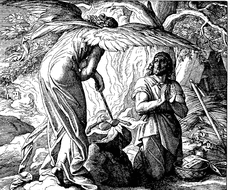 by Steven Norris So, another thought that didn’t make it into this past Sunday;s sermon on the call of Gideon (Judges 6-7). Remember, these are initial reflections and are not fully developed, but I pray that you may find something that sparks your imagination and deeper engagement. The story of Gideon gives frequent allusions to other characters found in the Hebrew Bible. Some of these are obvious (Moses, Elijah, etc.) but some are not. It is common to find in the Hebrew Bible that when a person had a significant encounter with God, they would set up some kind of monument or altar to remember the experience. Abraham set up more than one altar (Genesis 12:7, 8; 13:18). Isaac set up an altar (Genesis 26:23-25). Jacob set up a pillar (Genesis 28:18-19). These were important places of remembrance, places that they could return to over and over again to remember the Divine Presence and to reaffirm the Divine Call on their lives. Gideon turns the stone where his offering was consumed into an altar for the Lord. The flames that had consumed the bread and the meat had no doubt marked the stone in a real and tangible way. It had been a confirmation for Gideon of God’s Divine Call, so it became an altar – a place he could return to in times of doubt and discouragement; a place where he could remember when the call was clear and undeniable. You see, it’s not enough to just tear down pagan altars. We need to build altars to the Lord. We need to stake out those places where we have heard the voice of God clearly and have been changed by God’s call on our lives. I wonder, where are the altars in your life? Where are the holy spaces where you’ve heard God clearest? How have you set up a memorial to remind you of that call and comfort you in times of doubt and struggle? originally posted at www.stevennorris.com 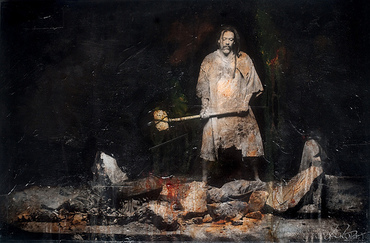 by Steven Norris So, this past Sunday I preached on the call of Gideon (Judges 6-7). It is such a rich story and we had only a short amount of time to spend on it, so I thought I would share a few of my additional thoughts and insights here. Obviously, they are merely initial reflections and are not fully developed, but I pray that you may find something that will further your reflection on, and interaction with, the scripture. God had called Gideon to deliver the Israelites from the oppression of the Midianites. According to the scripture, this oppression had come as a result Israel’s disobedience and worship of other gods. Therefore, Gideon’s first step was to tear down the altar to Baal and the Asherah that were right there in his father’s field. To fulfill God’s call in our lives begins with removing all the other distractions that compete for our allegiance. I would venture to bet that there are not many of us who have stone altars in our backyards to pagan deities, but we do have idols. We have things that hold us back and keep us from giving ourselves fully to God. We have things that consume our time, energy, attention, thoughts, money, and resources. There are things that bring anxiety and fear. These may not be bad things, necessarily, but if they are keeping us from fulfilling God’s call for us, they may qualify as idols. Look at your own life. What idols need to get torn down so that you can fulfill God’s call for you with whole-hearted abandon?
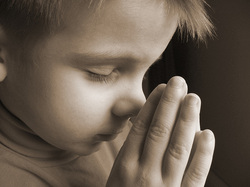 Prayer. It's one of the most important things we do as a Christian. Even though this is true, how well do you we do at teaching our children how to talk to God? Where do we begin? At what age do we start? These are all good questions. The short answer is that it is never too early to start developing a heart of heart in your child's life. It begins by modeling it for them. Then, just let them pray - don't over-analyze it. Below are a few links to some good articles on helping children understand prayer and begin to practice it in their lives:
Do you have your own ideas? Tell us about them in the comments section below. 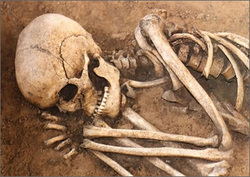 Today's Scripture focus: Ezekiel 37 When my wife and I took our honeymoon, we were living right on the poverty line. I had graduated college and was working three jobs just so that we could pay bills and she could finish her final semester of internship. Therefore, there were no fancy cruises or big trips planned. Instead, we went to Vicksburg, MS and stayed in a bed and breakfast over a long holiday weekend. We visited the Coke museum, the toy museum, ate out, and went to a movie. However, one of the things I really remember was the visit we made to the Vicksburg National Military Park. This park contains 17,077 graves of Civil War soldiers, of which 12,909 are unknown. Row upon row of white tombs stand as a testament to the horrors of war and the death that inevitably follows. I can’t help but picture a scene like this when I read today’s scripture passage. God leads Ezekiel to a valley that is littered with bones, picked clean, and decayed almost to the point of being nothing but dust. We don’t really know what has transpired in this valley. Was there a war? A famine? A drought? A plague? All we know for sure is this: there is no life here, only a monument to death. It seems so appropriate for a season in which we follow Jesus out into the desert of temptation, a season in which we follow the Israelites out into the wilderness of Sin. We enter into the reality of our own valley of dry bones. We look at the mounting casualties of our own war with sin and death. We see what was once our life strewn to and fro across the dry wasteland of temptation, sin, and rebellion. And it is in this situation that we hear the words of God ringing in our ears, “Can these dry bones live again?” It is a great question. In fact, it is the question of our life. In the midst of our failure, is redemption possible? In the midst of our abandonment, is reconciliation possible? In the midst of our pain, is healing possible? In the midst of our death, is new life really possible? Can God really cause these bones to rise again? Can God really really bring good out of tragedy? Can God really breathe life where there is only death? I can do no better than to echo the prophet Ezekiel, “O Lord God, you know.” When I look with my human eyes, I see hopelessness. When I look at my life - all the struggles I have on a daily basis, the ongoing sin, the temptations I give in to day after day, I just want to throw my hands up in the air and give up. I can get so depressed by my own faithlessness that I can’t do anything, much less actually believe that another reality is possible. But then I remember that I can only see things from my own limited perspective. I remember that God has the wide-angle lens to see what is possible with my life (and yours). Ezekiel describes God’s intervention in this helpless situation. He commands the prophet to speak, saying, “Come the four winds, O breath, and breathe on these slain, that they might live.” The word for breath here is ruach, and is the same word used for the Spirit of God. The prophet is saying, “Come, O Spirit of God, from the four corners of the world, from the very edges of creation, and converge in this place. Let the storm of your creation and re-creation descend to bring life where there is no hope of life. Let this dead ground be the fertile soil from which resurrection springs.” As we draw closer and closer to Easter, this story is a reminder that the resurrection is not just about Jesus. We need new life. I need new life. These dry bones are the reality of our life, our very existence (or lack thereof apart from Christ). God wants to do more than rehabilitate our lives. God wants a total renovation. God wants to do more than resuscitate our old bodies. God wants to give us new life. God wants more than revival. God wants re-creation. God wants resurrection. Let it be so, O Lord. Let it be. Prayer: God, I often find myself overwhelmed in my own valley of dry bones. My life lays in ruins and I feel hopeless. Breathe your life into me. Breathe your Spirit into me. Resurrect me and give me new life, I pray. Amen. 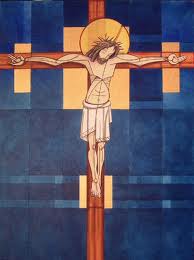 Today's Scripture focus: John 12:20-33 “Tell me the story of Jesus,” I recently asked an adult Sunday School class. Someone chimed in, “We have all sinned and are separated from God. God sent his son Jesus who died for us on the cross to pay the price for our sin. If we believe in Jesus, we will have eternal life with him in heaven.” Not too bad. Sounds pretty familiar. Is that all? Is there more to it than that? Have we gotten so comfortable with our Four Spiritual Laws tracts and John 3:16 signs that there is a whole in our understanding of the gospel. Don’t misunderstand me, I’m not saying that this was not a good explanation. The person who articulated this was echoing what would be known in theological terms as the penal substitutionary theory of atonement (try throwing that around at parties with your friends). Basically it goes something like this: We all have sinned. God is angry at sin. There is a punishment for our sin, which is death. Jesus came to earth. On the cross, God took out the anger and punishment that should have been directed to us on Jesus. As we believe in Jesus, we are forgiven (i.e. our sins are covered). The thing is that, while you can find this understanding clearly articulated in scripture, this is only one understanding of the cross and the issue of atonement. This is not what we find here in today’s passage from John’s Gospel. From the very beginning, we get the idea that John is telling a different story. The other three gospels start with stories about Jesus’ life on earth - Matthew and Luke begin with his birth, while Mark begins with Jesus’ baptism. John, on the other hand, has a much bigger agenda in mind. John starts with “in the beginning. . .” (John 1:1). John is not starting with Jesus’ life on earth. No, John is writing a new Genesis here. John is going all the way back to the beginning. John wants to frame the conversation about a bigger, more powerful, Jesus, who was with God at the creation and who is one with God. Therefore, when John turns his eyes to the cross, he has much more in mind than the forgiveness of individual sins. He has in view something much deeper than a substitutionary atonement through which Jesus takes on divine punishment to relieve us from our guilt. Jesus says, “Now is the judgment of this world; now will the ruler of this world be cast out” (John 12:31). For John, the cross is about divine judgement - not on individuals because of their sin but on “the world” (we should not understand world as all of God’s creation, but as “the fallen realm that exists in estrangement to God and is organized in opposition to God’s purposes” (Charles L. Campbell). Campbell goes on to describe this “world” as a reality outside of humanity. It comprises the institutions that shape human life and seek to hold them captive in destructive, life-taking ways. Therefore, when John says that Jesus has come to bring judgment and cast out the ruler of this world, we are to understand that Jesus has come to perform an exorcism. There is a demon set loose in this world (we know him as the master deceiver, the chief demon, Satan himself). We see the results of Satan, not just in the individual temptations and sin that confront humanity, but in the larger structures that threaten our society - violence, poverty, consumerism, racism, sexism, and any other device that one group uses to dominate another. This run counter to the very heart of God - the desire to bring shalom on the earth - to put everything in its rightful place to exist for the purpose that God created it, not for the way it can be exploited. Jesus has come to call the whole structure into question, to challenge the status quo, to “unmask the powers” (to use Walter Wink’s phrase). But Jesus doesn’t stop at unmasking those powers. Through the cross, Jesus exorcises those powers. Jesus completely defeats those powers once and for all. Jesus begins a new era in the world. A new day has dawned. There is a rightful king . . . and Satan is not it. And the scope of this king’s kingdom is not limited to those who will go to heaven after we all die. No, this whole world has been influenced by a pseudo-king that has done his best to imitate God, but could muster no more than a vague shadow. Jesus’ kingdom includes setting all of creation back on track - to fulfill the purposes for which God has created them. Therefore, as we draw closer to the cross in our Lenten journey and as we meditate today on this text, let us remember that the battle is much larger than our own personal struggle with sin. Let us remember that Jesus’ death accomplished more than my forgiveness. It began the process of setting the entire world straight. It was (and is) the final victory over the ruler of this world. It was (and is) the source of new life and resurrection. He truly was lifted up, so let us trust that we are now in the process of being drawn, along with all creation, to his side where we will worship forever and ever. Amen. Prayer: God, this is about so much more than my personal sin. I confess to you the many ways we have the ruler of this world to distract us and lead us away from your plan for our lives and this world. I confess that I am complicit in this. Forgive me. Open my eyes and let me see the deeper structural sins at work. Give me courage to speak out and address them with boldness and courage. You are the only rightful king. Amen.  Today's Scripture focus: John 11:1-45 I’m a crier. I don’t care if you know that. I don’t care if you think less of me. I don’t think that it makes me any less of a man for admitting that. I cry at movies. I cry when a particular song strikes me. I cry sometimes when I preach. I cry as a result of my deep love for my family. I even cry during those sappy Hallmark commercials that are written to tug on a person’s heart strings. This wasn’t always the case. There was a season in my life that I was extremely emotionally constipated. There was a time when nothing seemed to get through to me. Movies didn’t seem to move me. Music didn’t seem to move me. Relationships weren’t moving me. I became very distant, closed off to those that I cared about the most. My everyday conversation changed as well. I became increasingly sarcastic and cynical (I naturally lean in that direction already). My once witty remarks were becoming more and more biting and hurtful. Finally, a friend of mine confronted me about it. “I don’t know what is going on, but you are not the same person. You are becoming more and more isolated from the people that love you. You are becoming more and more hurtful with your comments. The joy just seems to be sucked out of your life.” I was very appreciative for his courage in coming to me. Ok, well actually I was angry and resentful at the fact that he had come to me, but later I was thankful. The truth is, I had been struggling with one of those deeply imbedded sins in my life. I had not acknowledged just how much I was hurting and just how many casualties I was creating because of my failure to acknowledge that sin and deal with it. The confrontation from my friend was the first step in a process of healing and restoration that I desperately needed in my life. Today’s scripture passage reminded of this incident years ago. It is one of those strange passages in the gospels that I don’t fully understand. Why would Jesus sit around and wait a couple of days while his close friend is dying? Why would Jesus refuse to heal him, even though we’ve seen Jesus heal from a distance before? Why would Jesus take his dear sweet time to get there, arriving four days after Lazarus has been placed in the tomb? Of course, John tips his hand early on in the passage. “This illness does not lead to death. It is for the glory of God, so that the Son of God may be glorified through it,” Jesus says. When Jesus arrives, Martha echoes these same questions when she says, “Lord, if you had been here, my brother would not have died.” Put a little less nicely, she seems to be saying, “If you hadn’t of sat around twiddling your thumbs, my brother wouldn’t have died. I thought he was your friend, Jesus! Thanks for nothing.” Maybe that’s a little harsh, but it’s what I would have said. And then, we have those two little words. They are the shortest verse in scripture - the one we all wanted to be assigned to memorize in Sunday School because we couldn’t possibly mess it up. “Jesus wept.” Jesus wept at this confrontation with death. Jesus wept at this confrontation with the reality of sin. Jesus wept because those that he loved wept. He wept because his friends were suffering. Although Jesus’ power to heal is the main thrust of this passage, healing begins long before Jesus calls out into the darkness of the tomb. Healing begins in those two powerful words - Jesus wept. Healing begins as Jesus enters into the suffering of his people and joins in their tears. He has become one of us and he has offered to shoulder the burden we cannot bear alone. This is true of our Lenten journey as well. As we travel along, we are forced to look into the mirror and confront the fallenness of our own soul. We may very well find that we have become so hardened by our sin that we have lost access to that place in our soul where tears and emotions reside. We may find that, just as tears fail to come, joy is likewise absent. The healing that God desires for us may begin long before we hear the voice of Jesus calling out into the darkness of our soul. That healing may very well begin when Jesus embraces us, places his head on our shoulder, and weeps with us over the reality of our sin. Prayer: God, I acknowledge that the sin in my life has estranged me from the life you have planned for me. My sin has isolated myself from the very emotions that are intended to animate my life. Thank you for joining me in my despair and for taking my burden upon your shoulder. May your tears bring me life and healing. Amen. |
Ecclesia Writer's ConsortiumWe are blessed at Ecclesia to have a number of gifted writers and teachers. Here, you'll find devotions, meditations, and musings from a sample of those writers. Archives
June 2015
Categories
All
|
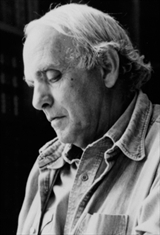

 RSS Feed
RSS Feed